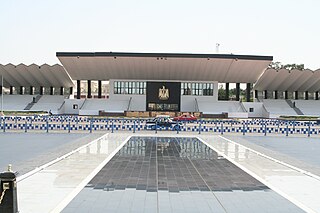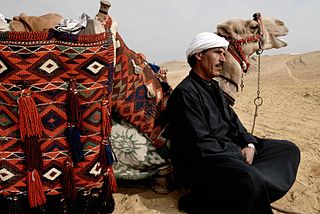The February 2009 Cairo terrorist attacks were three incidents that took place in Cairo, Egypt from 22 February 2009 to 28 February 2009. Of three attacks, only the first was fatal, resulting in the death of a 17-year-old French teenager. The attacks appeared to have been directed variously at foreign tourists and Egyptian nationals alike. None of the attacks was described by Egyptian security officials as sophisticated. The motivation of at least two of the attacks was not clear, but the spate of violence came amid heightened tension following the 2008-2009 Israel-Gaza conflict, during which Egyptians had protested against their government's closure of the Rafah Border Crossing. [1]
At 18:30 local time on 22 February 2009, a bomb exploded in Khan el-Khalili, a souq in eastern Cairo. [2]
The attack took place just after dark in front of a cafe crowded with people gathering to watch a televised football match. There were conflicting reports that the bomb was thrown from a balcony or from a motorcycle, [3] but security officials reported that the bomb had exploded under a bench in a garden in the square. A second bomb failed to detonate and was defused. [1] The bombs weighed 1.5 kilograms (3.3 lb) and contained nails and metal fragments. [3] A 17-year-old French girl, who was among a group of 54 teenagers from Levallois-Perret, near Paris, was killed. 17 French, one German and three Saudi tourists, as well as three Egyptians, were wounded. [1] [2] Early reports suggested the explosive devices were "primitive". [1]
According to security sources, there was no immediate claim of responsibility by any militant group, but three suspects had been taken into custody. [4]
On 28 February 2009, an American teacher walking through Khan el-Khalili was stabbed by an Egyptian man. The victim, who taught science at the American School of Alexandria in Alexandria, Egypt, [5] received superficial stab wounds to the face. [6]
Police quickly arrested a 46-year-old Egyptian laborer, Abdel Rahman Saleh Taher Mohammed (Arabic: عبد الرحمن صالح طاهر محمّد), whose motive was quoted by the Egyptian state-owned news agency MENA as being a "hatred for foreigners because of the Israeli offensive in Gaza". [5] It was subsequently revealed that the suspect had been detained in a mental hospital in 2000 for assaults on tourists and police officers. [6]
Later on 28 February 2009, at least one firebomb was thrown from a bridge at a passing train on the Cairo Metro. [7] The attack took place near to the Line 1 station of Helmiet El-Zaitoun, near Ain Shams in north-eastern Cairo. The perpetrators fled the scene, and witness reports identified the suspects variously as a single man or two boys. [7] [8] No one appeared to be hurt, and the incendiary devices may have failed to detonate. [7] [8]
The April 2005 attacks were three related incidents that took place in the city of Cairo, Egypt, on 7 April and 30 April 2005. While the first killed three bystanders, the latter two incidents are generally considered to have been minor, in that they caused no loss of life other than those of the perpetrators and appear not to have been planned in advance. Neither sophisticated methods nor sophisticated materials were used in the incidents, and the Egyptian authorities have consistently described the attacks as "primitive".
The 2005 Sharm El Sheikh bombings were committed by Islamist group Abdullah Azzam Brigades on 23 July 2005 in the Egyptian resort city of Sharm El Sheikh, at the southern tip of the Sinai Peninsula. Eighty-eight people were killed by the three bombings, the majority of them Egyptians, and over 200 were injured, making the attack the deadliest terrorist action in the history of Egypt, until it was surpassed by the 2017 Sinai mosque attack.

The 2004 Sinai bombings were three bomb attacks targeting tourist hotels in the Sinai Peninsula, Egypt, on 7 October 2004. The attacks left 34 people dead and 171 injured.

Khan el-Khalili is a famous bazaar and souq in the historic center of Cairo, Egypt. Established as a center of trade in the Mamluk era and named for one of its several historic caravanserais, the bazaar district has since become one of Cairo's main attractions for tourists and Egyptians alike. It is also home to many Egyptian artisans and workshops involved in the production of traditional crafts and souvenirs. The name Khan el-Khalili historically referred to a single building in the area; today it refers to the entire shopping district.

Terrorism in Egypt in the 20th and 21st centuries has targeted the Egyptian government officials, Egyptian police and Egyptian army members, tourists, Sufi Mosques and the Christian minority. Many attacks have been linked to Islamic extremism, and terrorism increased in the 1990s when the Islamist movement al-Gama'a al-Islamiyya targeted high-level political leaders and killed hundreds – including civilians – in its pursuit of implementing traditional Sharia law in Egypt.

The 2009 Khan el-Khalili bombing was a terrorist attack that took place at 6:30 p.m. local time on 22 February 2009 in Khan el-Khalili, a souq in eastern Cairo, Egypt, killing a 17-year-old French teenager and injuring 24 other people. It was the first of the February 2009 Cairo terrorist attacks.
The 2009 Hezbollah plot in Egypt involved the arrest of 49 men by Egyptian authorities in the five months preceding April 2009. Egypt accused them of being Hezbollah agents planning attacks against Israeli and Egyptian targets in the Sinai Peninsula. The arrests led to tensions between the Egyptian government and Hezbollah, as well as between Egypt and Iran.

The Abdullah Azzam Brigades, or al-Qaeda in Lebanon, was a Sunni Islamist militant group, and al-Qaeda's branch in Lebanon. The group, which began operating in 2009, was founded by Saudi Saleh Al-Qaraawi and has networks in various countries, mainly in Egypt, Iraq, Syria, Jordan, the Gaza Strip and Lebanon.

The Sinai insurgency was an insurgency campaign in the Sinai Peninsula of Egypt launched by Islamist militants against Egyptian security forces, which also included attacks on civilians. The insurgency began during the Egyptian Crisis, during which the longtime Egyptian president Hosni Mubarak was overthrown in the 2011 Egyptian revolution.

The 2014 Taba bus bombing was a terrorist attack on a tourist coach in Taba, Egypt on 16 February 2014. The bus had been parked, waiting to cross into Israel at the Taba Border Crossing, when a lone suicide bomber entered the open bus and detonated his explosives. Four people – three South Koreans and the Egyptian bus driver were killed, and 17 others injured.
The following lists events from 2014 in Egypt.
Soldiers of Egypt was a Salafist Islamist militant group that operated near Cairo, Egypt. The group was founded by Humam Muhammed in 2013, after he split away from the Ansar Bait al-Maqdis militant group. The group claimed that its attacks were "retribution" for the August 2013 Rabaa Massacre; notably, the group targeted only security forces. It warned civilians of the presence of bombs that it placed.
The following is a chronological timeline of fatal incidents during the ongoing Sinai insurgency, which was invigorated by a period of relative instability and political turmoil in Egypt, beginning with the 2011 uprising against former autocrat Hosni Mubarak. Insurgent attacks, however, intensified significantly following the July 2013 coup that ousted Muslim Brotherhood-backed president Mohamed Morsi and subsequent crackdown on his supporters.

In July 2013, at the same time as mass protests began against the 3 July coup d'état which deposed Mohamed Morsi, and in parallel with the escalation of the already ongoing jihadist insurgency in the Sinai Peninsula, pro-Muslim Brotherhood militants started violent attacks against policemen and soldiers in central and western Egypt. In the following months, new Islamist armed groups were created to reinstate Islamist rule in Egypt, like Soldiers of Egypt and the Popular Resistance Movement. Since 2013, violence in mainland Egypt has escalated and developed into a low-level Islamist insurgency against the Egyptian government.

On 11 December 2016, a suicide bomber killed 29 people and injured 47 others at St. Peter and St. Paul's Church, a chapel next to Saint Mark's Coptic Orthodox Cathedral, seat of the Coptic Orthodox Pope, in Cairo's Abbasia district. Egypt's President, Abdel Fattah el-Sisi identified the bomber as 22-year-old Mahmoud Shafiq Mohammed Mustafa, who had worn a suicide vest. el-Sisi reported that three men and a woman have been arrested in connection with the attack; two others are being sought. ISIS claimed responsibility for the attack.

Terrorism and tourism in Egypt is when terrorist attacks are specifically aimed at Egypt's tourists. These attacks often end in fatalities and injuries and have an immediate and sometimes lasting effect on the industry. Attacks take many forms; blowing up an airplane carrying tourists, drive-by shootings of tourists, knife attacks on tourists and suicide bombings in a location where tourists are congregated. On the timeline of these events, the 1997 Luxor Massacre stands out as the worst in the history of attacks on tourists in Egypt.